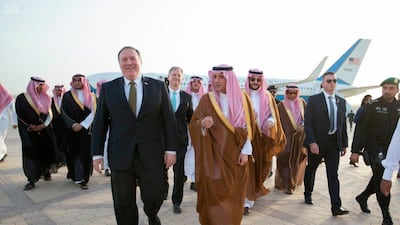It is less than a week into his tenure as the new US Secretary of State but already Mike Pompeo is pinning his colours to the flag and demonstrating where his priorities lie. He began with a trip on Thursday to Brussels, where he impressed Nato leaders, recognising as "invaluable" an institution his boss Donald Trump had once written off as "obsolete". Mr Pompeo also distanced himself from his ineffectual predecessor Rex Tillerson by speaking stridently of the flawed Iran nuclear deal, noting that "absent a substantial fix, absent overcoming the flaws of the deal", the US president is unlikely to recertify it. On Saturday, he landed in Riyadh with a clear sense of purpose for the start of a Middle Eastern trip that includes Jerusalem and Amman. The locations for his first official tour of duty were selected, the state department said, to reflect their "importance as key allies and partners in the region". That special US-Saudi relationship has rarely been more crucial to security and peace in the region than it is now. With multiple threats from conflicts in Syria and Yemen, Iran's destabilisation attempts and Qatar's collusion with and funding of extremists, such alliances are vital to seeking long-term political solutions. Mr Pompeo's visit will also offer a chance to raise the issue of the controversial US embassy move next month from Tel Aviv to Jerusalem, a decision which has potentially catastrophic repercussions for the region.
Mr Pompeo, who previously visited the Middle East as CIA director last year, is well-versed in the region's most pressing issues. His appearance was in marked contrast to Mr Tillerson, who was fired from the post last month and whose budgetary and staff cuts compromised the State Department's ability to advance US interests abroad, to the extent that Iran, Turkey and Russia have been able to exploit the subsequent power vacuum to their advantage. Tehran, above all, has taken steps to destabilise countries across the region,where it has funded, trained and armed its proxies. In Yemen, it continues to back the Houthis, who regularly hurl missiles into Saudi Arabia. With the May 12 deadline to recertify the Iran nuclear deal looming, it is reassuring that Mr Pompeo is well-versed in Tehran's aggression. In him, the US has a chief diplomat who can speak for its president and at a time of great tumult, his decision to visit Saudi Arabia in his first week on the job is greatly encouraging.
His meetings with King Salman and Crown Prince Mohammed bin Salman have given the two countries a chance to discuss the region's key priorities. The warm reception that awaited Mr Pompeo on the runway in Riyadh suggests they took full advantage of that opportunity. Appearing alongside Foreign Minister Adel Al Jubeir, Mr Pompeo stressed the need for unity in the Gulf and rightly labelled Iran "the greatest sponsor of terrorism in the world". In a few days, Mr Pompeo has already shown his mettle. At a moment of great complexity, his ability to project US power in concert with its Saudi allies has potentially profound implications for the security of a volatile region.

